#elizabeth olive marston
Explore tagged Tumblr posts
Text
A note from Pete’s brother Byrne in his official obituary offers an inside peek at Pete’s role in early Wonder Woman comics:
My brother Pete was always a man of enormous imagination. As a kid, he was a dreamer. When we were teenagers our dad, who was often under pressure to produce scripts for his Wonder Woman superheroine, offered $100 to anyone writing a usable scenario for a Wonder Woman episode. Though $100 was a fortune at that time, Pete was the only one of us who could dream them up.
Pete seemed to have had a good relationship with his father. On top of pitching plots for Wonder Woman, Pete also left Harvard in the mid-1940s to return home and help care for his father. William Moulton Marston had polio and cancer, and passed away in 1947. It’s lovely that Pete created such a testament to his father’s creation with his Wonder Woman Museum. The museum is also a testament to the women who raised him; Pete’s mother, Elizabeth, gave Marston the idea to create a female superhero, and the Marstons lived in a polyamorous relationship with Olive Byrne, who raised the kids (Marston had two with each woman) and also inspired key elements of Wonder Woman’s look and personality.
Regrettably, I never got the chance to interact with Pete directly, though his daughter Christie was a great help when I was researching Wonder Woman Unbound and I know that Pete had a big hand in the materials that she sent me and the recollections that she was able to share. By all accounts, he was a kind and warm man; everyone who visited the museum (a guest list that included Lynda Carter herself!) seemed to come away with an appreciation and affection not just for its myriad wonderful items but also for the man who assembled it all.
-January 19, 2017
#wonder woman#william moulton marston#dc comics#diana prince#wmm#pete marston#olive marston#elizabeth olive marston
2 notes
·
View notes
Text
Friendly reminder that the guy who made Wonder Woman was polyamorous and based her on his wife and their girlfriend. Can you imagine? To love someone so much that you use your position to portray them as a literal goddess of love and hope and truth? And to fill that concept with so much love and heart that she becomes one of the three pillars holding up DC as a whole? Those are the things the world is built on I think.
#will marston elizabeth marston olive byrne you will always be famous#and ofc all the uh totally vanilla sex habits that built upon the character and her world#they walked so stjepan sejic could run#wonder woman#also sidenote apparently the dude lied about inventing the polygraph which.#idc what you say lying about creating the machine that catches you lying is objectively hilarious#diana prince#diana of themyscira#diana of themiscyra#wonder women#william moulton marston#olive byrne#elizabeth holloway marston#charles marston#dc comics#dc trinity#dc#bro every time i try to do a post like this i learn smth like “oh yeah that dude sucked actually” pls can we not do that with this one ong#i did like a whole check before making this post just to ensure that it wouldn't be awkward#plus i think id just be sad
29 notes
·
View notes
Text
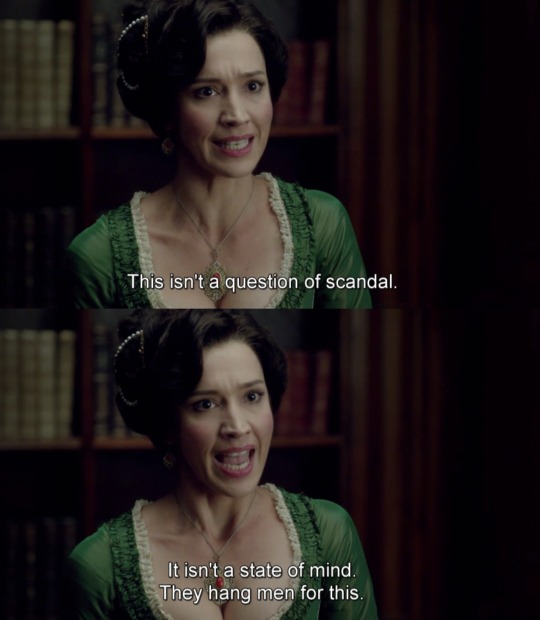
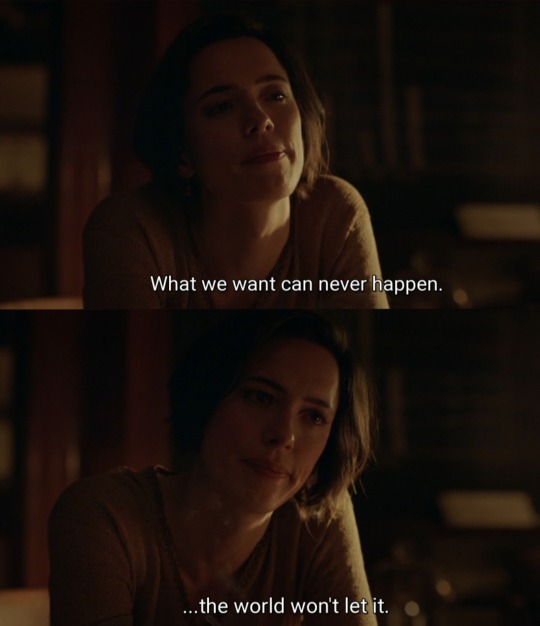
"Our love is illegal."
Louise Barnes as Miranda Hamilton in Black Sails (2014-2017) / Rebecca Hall as Elizabeth Marston in Professor Marston and the Wonder Women (2017).
#i just#aaaggghhhh#yknow#do you think its possible to love two people at the same time#and then they did!#all of em!#black sails#professor marston and the wonder women#theyre a throuple your honour#throuple#throuples#miranda hamilton#miranda barlow#elizabeth marston#flinthamiltons#flint x thomas x miranda#bill x elizabeth x olive#professor marston#rebecca hall#louise barnes#mine
137 notes
·
View notes
Text
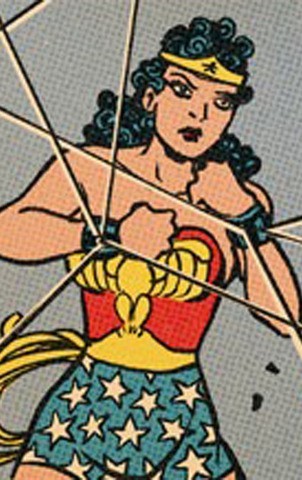
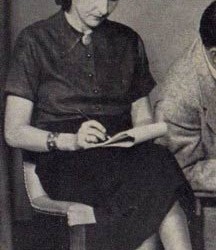
Wonder Woman's bracelets were inspired by those worn by Olive Byrne, who the character was primarily based on. Byrne was in a polyamorous relationship with William and Elizabeth Marston and is said to have worn the bracelets to represent their unofficial marriage in lieu of wedding rings.
#wonder woman#olive byrne#diana of themyscira#dc comics#william moulton marston#elizabeth holloway marston#even after william passed away in 1947 olive and elizabeth remained together for 43 years
45 notes
·
View notes
Text
Happy Birthday Elizabeth Holloway Marston 🎂 co creator of Wonder Woman, feminist, kinky polyam icon 🙌
This is her official Wikipedia picture and I love it.

#elizabeth holloway marston#elizabeth marston#wonder woman#william moulton marston#olive byrne#polyamory
11 notes
·
View notes
Text

Golden Age Wonder Woman always goes hard.
#dc comics#sensation comics#wonder woman#diana prince#william moulton marston#elizabeth holloway marston#olive byrne#feminism#comics
5 notes
·
View notes
Text
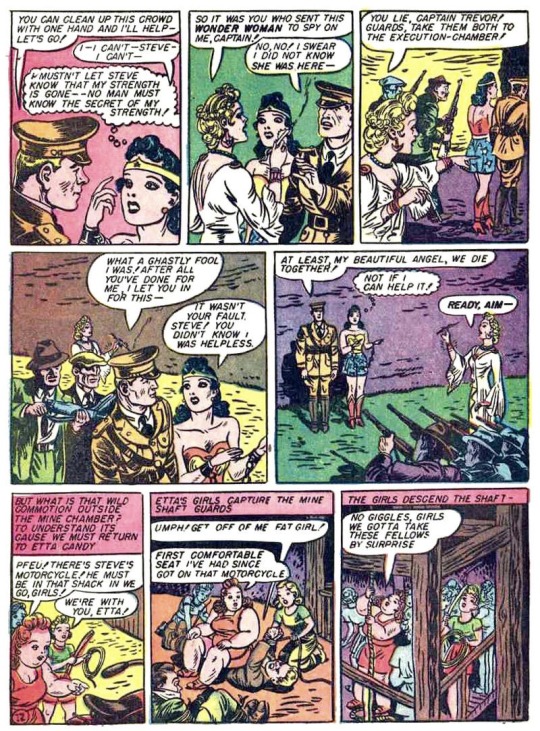
Wonder Woman is perhaps the iconic superheroine. With her godlike powers, lasso of truth and Amazon heritage, Princess Diana of Themyscira is understandably looked on as one of the clearest manifestations of female power in the comic book universe. There is of course a backstory to WW’s dominant appearance and that lies with the attitude and views of her creators, writer William Moulton Marston and illustrator Harry G Peter. Marston in particular was heavily influenced by his feminist wife, Elizabeth who wanted her husband to create a powerful female hero, physically superior to men, and equal to them intellectually to demonstrate women’s potential to challenge the restrictive gender roles of the early 1940s. The Marstons lived an unconventional lifestyle, establishing a ménage a trois with the beautiful dark haired Olive Byrne, who Peter allegedly used as his inspiration for Diana’s appearance. William Marston’s liberal and pro-feminist views were real enough, but he also had a deep fascination with the bondage fetish and his Golden Age stories are filled with imagery of Wonder Woman being tied up, chained up and generally held captive by any number of male and female villains. It was therefore no accident that Diana’s principal weapon is not her super strength or robot plane, but her golden lasso - a lariat that compels anyone caught in it to tell the truth, but which is also a super tough rope very useful for restraining enemies who did not wish to be captured by the Amazon.
As can be seen from the page above, the bondage in Marston’s and Hay’s work was not confined to Wonder Woman herself. Her college sidekicks, the Holliday Girls led by the overweight but irrepressibly cheery Etta, were frequently bound and gagged and requiring Amazonian rescue, but were more than capable of dishing out the bondage themselves when the occasion arose. As the relative comics artistic freedoms of the wartime years were pulled back in the 1950s, and the portrayal of Wonder Woman passed to other illustrators, the fetish imagery associated with the character was considerably reduced. However, Wonder Woman has remained a favourite comic book character, female role model and feminist icon ever since. The groundbreaking Marstons would be proud.
Source: Wonder Woman: the Golden Age Omnibus Vol 1 (2023)
#wonder woman#diana prince#dc comics#golden age of comics#william moulton marston#Elizabeth marston#comics feminism#olive byrne#princess diana of themyscira#the Holliday girls
13 notes
·
View notes
Text
I was at a book launch with a friend last night--the book itself was a richly illustrated album containing biographies of women from history wo, for different reasons - forward in romance, having power, demanding recognition - were labelled a whore during their lifetime. It was written by two very sweet women, and whole launch was just lovely.
The friend bought the book and some of their earlier stuff (the yhave written several similar books on women's history before, and one of them also has several historical novels published), and we remained behind to have them signed and to have a few words with the authors - and I mentioned them that they would surely find William Moulton Marston's story fascinating with his "pro-women" crusade and two wives who pretty much enabled his carreer (the authors were fascinated, made a note of it, and thanked me for the tip).
And then somebody behind my back just yelled in "akshually, the two women were in love with each other, not with Marston."
First of all, RUDE. Second of all, you have seen Professor Marston and the Wonder Women, have you? Bless your heart.
I hate that movie. Okay, I have a love-hate relationship with it, because it does a good job at explaining Martson theory. But all the historical bits are basically bullshit, and let's be clear here: the movie was written and directed by a lesbian woman, and she pretty much pushed the envelope on the clear lesbian angle.
The truth is... we will problaly never know the whole story. But the facts: 1, Marston brough Olive into the relationship, and pretty much said that Elizabeth either accepts her, or he is choosing Olive. Elizabeth wasn't present for the beginning of the relationship. 2, Marston did have this idea that a woman who has sexual relations with another woman will be a better lover for her man 3, The children (both Elizabeth and Olive had two kids from Marston) didn't know that they were biologically half-siblings, or that Olive and Marston were lovers. Olive An, Elizabeth's daughter, still said, as late as in 1999, that Olive was their housekeeper. 4, After Marston's death in 1947, Olive and Elizabeth lived together for the rest of their lives, altough Marston's biographer, Jill Lepore, puts it down firmly that they had seperate bedrooms (which the other end of the envelope pushing, imho).
So it's likely that there was something between Elizabeth and Olive, but it's clearly Marston who was the center of this relationship-universe. To say that the primary relationship was between Elizabeth and Olive is inaccurate.
...And to yell it from behind my back while I'm talking to the authors is rude.
12 notes
·
View notes
Text

13 notes
·
View notes
Text
Wonder Woman 80 anniversary
Wonder Woman first appeared in All Star Comics #8 in October 21, 1941So this month we celebrate her 80 anniversary! YAY! Creators: W. Moulton Marston, H. G. Peter, Elizabeth Holloway Marston and Olive Byrne Art: Mariano NavarroColor: Hernan Cabrera——– Wonder Woman apareció por primera vez en All Star Comics #8 el 21 de octubre de 1941.¡Así que este mes celebramos su 80 aniversario!…
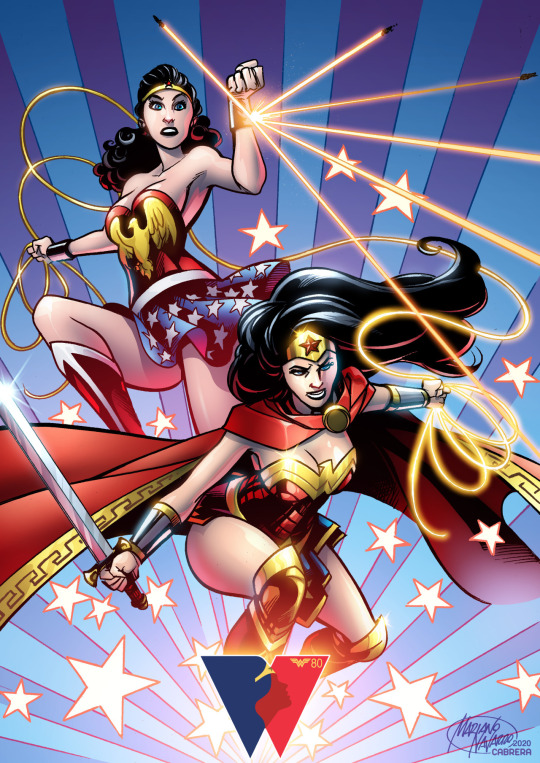
View On WordPress
#dc#dc characters#dc comics#elizabeth marston#fanart#hernan cabrera#hernancabrera#mariano navarro#marianonavarro#olive byrne#william marston#Wonder Woman
2 notes
·
View notes
Text
Hand one, more people should know about this.
Hand two, this downplays his wife's role, the role of their marriage's third partner, and for fucks sake, doesn't even mention their names - Elizabeth Holloway and Olive Byrne.
So keep reading more about this, friends, and learn some history:
https://www.smithsonianmag.com/arts-culture/origin-story-wonder-woman-180952710/
So there was this psychologist who invented a type of blood pressure test, and while testing it on his wife, he noticed her blood pressure seemed to be elevated when she was angry or excited. This fact lead to a California police officer named John Augustus Larson to develop the polygraph, aka "lie detector", by combining the blood pressure test with several other measurements in an attempt to determine if the subject is lying.
This has lead the psychologist to be known as the father of the polygraph, even though he didn't directly invent it. He definitely tried to commercialize it, though including appearing in a series of ads for Gillette Razors, using the lie detector as a theme.

A few years after the invention of the polygraph, he published a book titled "Emotions of Normal People", heavily based on the original research of his life partner (as he and his wife were in a polyamorous relationship, living together for many years (including 50 years after his death!) and having two of his children). In it, he provided a defense of many sexual taboos. In it, he developed the DISC theory: dominance, inducement, submission, and compliance. He assigned active and passive to emotions and behaviors, and environments as antagonistic and favorable, and theorized how these different attitudes and environments interacted. For example, "Submission produces passivity in a favorable environment".
This was pretty much exactly as BDSMy as it sounds, with him also having theories about how the masculine drive for freedom was inherently violent, whereas women could use their "loving allure" to lead people to an ideal state of submission to loving authority.
Anyway in 1940 he was interviewed by his life partner under a pseudonym, and said that there was great potential for education in the medium of comic books. This interview got read by Max Gaines, a comics books publisher, who co-founded All-American Publications (one of the companies that later merged with National Comics Publications to form DC Comics). The psychologist was hired on as an educational consultant.
After a conversation with his wife about creating a new super hero based on fighting with love instead of fists, he took the idea to Max Gaines and was given approval to create a comic under this idea. His wife's main contribution was the idea that the hero should be a woman.
In any case, the polyamorous psychologist with a bondage kink who had formerly helped invent the lie detector went on to develop his super hero comic based on all these influences. So in 1941, under the pseudonym of Charles Moulton (combining his name of William Moulton Marston with Max Gaines' middlename), the first issue of Wonder Woman was published under the Sensation Comics line:
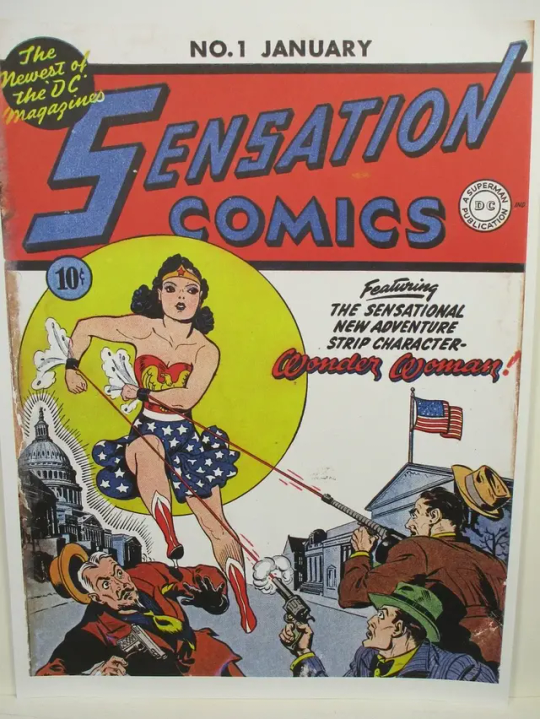
821 notes
·
View notes
Text
A few sapphic film recs!
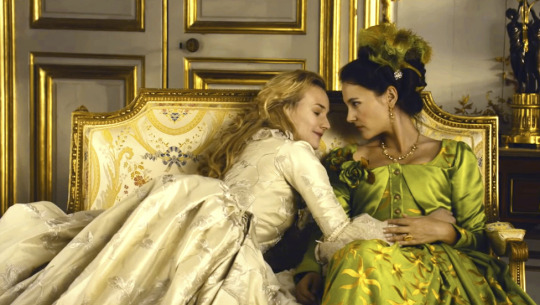
Just a few recommendations for sapphic films under 2 hours which may or may not have flown under the radar:
Moonlit Winter / 윤희에게 (1hr 45m, 2019, dir. Lim Dae-hyung)
Professor Marston and the Wonder Women (1hr 48m, 2017, dir. Angela Robinson)
Who's the Woman, Who's the Man / 金枝玉葉 2 (1hr 50m, 1996, dir. Peter Ho-Sun Chan)
Sisterhood / 骨妹 (1hr 37m, 2016, dir. Tracy Choi)
DEBS (1hr 31m, 2004, dir. Angela Robinson)
Farewell, My Queen / Les adieux à la reine (1hr 40m, 2012, dir. Benoît Jacquot)
Bonus - short film: Love Does Human / 사람 하는 사랑 (24 mins, 2019, dir. Oh Seon-ju)
Commentary under the cut!
1. Moonlit Winter / 윤희에게 (1hr 45m, 2019, dir. Lim Dae-hyung) - IMDB | MyDramaList

This movie is about a daughter (Kim So-hye) who finds out about her divorced mother’s (Kim Hee-ae) past with another woman (Katase Jun), and how in encouraging her mother to reconnect, the two finally open up to each other as well. Dry stuff on paper, but there’s more to it: the mother and her former lover didn’t just break up, they were split apart by their families as teenagers and the mother was forced to marry a man against her will. In short, it deals with the aftermath of the typical “bad ending” of older stories featuring WLW characters, wherein schoolgirls in love would be separated and married off to preserve the heteronormative status quo.
Although the queer relationship does not get much screentime at all – the two characters share a single scene, there are no flashbacks, and there’s not even a hug – queerness remains at the heart of the movie. It’s a rare depiction of how the repression of queerness leaves scars on people which affect how they engage with the world, but which also shows that as long as they are alive, there is still hope that those scars can be healed. Also, despite the heavy-sounding subject matter, it’s a very gentle experience: there are no direct depictions of homophobia and no sensationalism, just a little story of human connection unfolding in a snow-cloaked Hokkaido.
2. Professor Marston and the Wonder Women (1hr 48m, 2017, dir. Angela Robinson) - IMDB
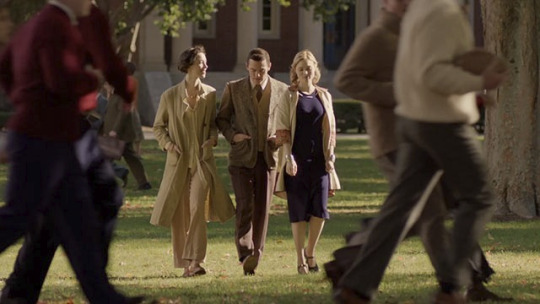
The blurb on IMDB says that this movie is about “psychologist William Moulton Marston (Luke Evans), and his polyamorous relationship with his wife [Elizabeth] (Rebecca Hall) and their mistress [Olive] (Bella Heathcote) who would inspire his creation of the superheroine, Wonder Woman”. As someone who is not particularly drawn to biopics, male protagonists, polyamory, BDSM, or Wonder Woman, I assumed that this movie wouldn’t be my jam and so didn’t watch it until quite a while later – which is when I discovered just how wrong I was.
First, the two women take up just as much of the movie’s focus as Marston. Elizabeth, Marston’s wife and fellow psychologist, is highly intelligent but equally highly-strung; she does not know how to deal with her husband’s attraction to new research assistant Olive, nor Olive’s attraction to both her husband and Elizabeth herself, and this internal conflict (even after the three enter into a polyamorous relationship) features heavily in the story. Second, although it declares itself to be “based on a true story”, the movie is not especially interested in recreating or representing the past. Rather, the historical elements are used as a framework to explore certain ideas: Diana’s Lasso of Truth symbolises how progress and healing must be first founded upon honesty, for example. The polyamory and BDSM is also not at all sordid or sensationalised, but rather presented in a nuanced (though still sexy!) manner. More than anything, this is a movie with a big heart and big ideas, and should be judged on its own merits.
3. Who's the Woman, Who's the Man / 金枝玉葉 2 (1hr 50m, 1996, dir. Peter Ho-Sun Chan) - IMDB | MyDramaList
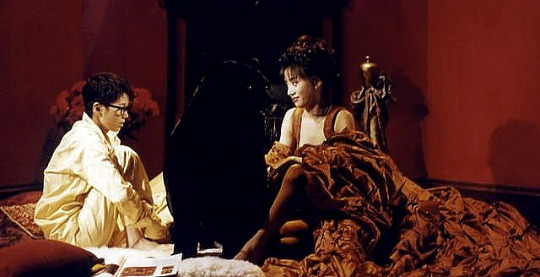
All you need to know going into this sequel of 1994 movie He's a Woman, She's a Man (金枝玉葉) is that main character Wing (Anita Yuen) is a woman who has found both fame and (heterosexual) love while disguising herself as a male idol, and that her relationship with record producer Sam (Leslie Cheung) is known to the general public— although it is perceived as being homosexual in nature due to her persona. At this point, you might be wondering why an M/F romantic comedy is on this list, but this movie is a bit odd in that instead of focusing only on problems such Sam’s internalised homophobia and misogyny (both of which are addressed in the story), one of the new obstacles facing the couple is the female lead meeting female pop star Fong Yim Mui (Anita Mui)… and both starting to fall for each other.
I was surprised at how sensitively Wing and Fong Yim Mui’s respective arcs are handled, especially for a mainstream movie from the 90’s starring two of Hong Kong’s most popular performers at the time. Instead of giving the two women a meet-cute and leaving it at that, a lot of care is put into showing them processing and coming to terms with their feelings in their own time. Romantic and sexual attraction is also highlighted separately, which is refreshing given how they are usually depicted as inextricably linked even now… Obviously Wing and Fong Yim Mui don’t end up together, but their feelings aren’t dismissed and – relative to the narrative constraints – the ending is a warm, optimistic one. Also, Anita Mui gives an absolutely award-worthy performance in one of the scenes with her character and Wing, so fans of her should definitely give this movie a try.
Important note: Although there’s much that’s good about it, Who's the Woman, Who's the Man is far from perfect. Early on, there’s a masquerade party where two of the characters are wearing masks which look like racist caricatures, and the masks are crop up in multiple scenes in the film. More serious is the subplot about a male character who keeps trying to win over a lesbian, culminating in her agreeing to sleep with him once while he’s dressed as a woman (CW: transphobia, homophobia) – though this storyline ends with the man accepting that she really is gay and parting on friendly terms. That said, these problems are already mild compared to the actively hateful transphobic and homophobic jokes present in so many of its contemporaries, so if you’ve watched a 90’s Hong Kong comedy before, chances are that your tolerance level is more than high enough.
4. Sisterhood / 骨妹 (1hr 37m, 2016, dir. Tracy Choi) IMDB | MyDramaList
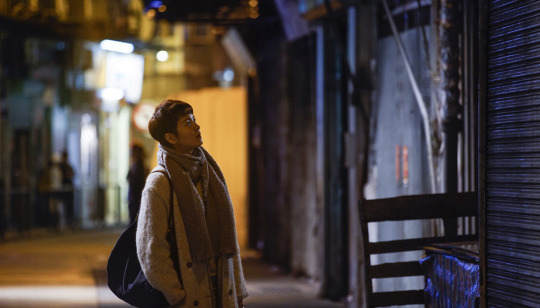
Sisterhood opens with tragedy. Originally from Macau, main character Sei (Gigi Leung) is living quietly in Taiwan with her husband after the 1999 Handover when her life is overturned by a newspaper personal ad informing her that her long-estranged friend and colleague Ling has passed away. The movie is shot through with flashbacks to earlier times, tracking a young Sei (Fish Liew) as she starts doing sex work and is taken under the wing of the more experienced Ling (Jennifer Yu) and her friends. Memories of togetherness and community are juxtaposed against sequences of present-day Sei struggling to navigate her grief, the tensions of the now-fractured friend group, and a Macau that has changed just as much as she has. The acting and script can be clunky in places but the sentiment shines through, especially after the first third, at which point the movie starts honing in on Sei and Ling’s relationship. It’s not a happy story, but nor is it defined by sadness; instead, it posits that the past is not merely to be mourned, that it is instead something that can shape and provide a foundation for the future. I won't talk too much about how queerness figures into this story, due to spoilers, but rest assured that it is present and important!
5. D.E.B.S. (1hr 31m, 2004, dir. Angela Robinson) - IMDB
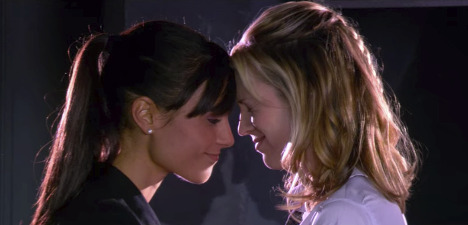
Okay, you've probably heard of this one before if not watched it already, but anyway! This was the first WLW movie I watched, and for a long time, the only one which I actually enjoyed. It’s about an elite spy (well, more like an honours student at spy school) (Sara Foster) and a criminal mastermind (Jordana Brewster) falling for each other, a premise which is just as fun and over-the-top as it sounds. The movie does a great job of mixing action, humor, and romance, and it doesn’t overstay its welcome – it’s got a nice compact runtime and a cracking pace. There’s still nothing quite like it in my opinion, though I’m very welcome to any recommendations in this line (my askbox is open if you have any!).
6. Farewell, My Queen / Les adieux à la reine (1hr 40m, 2012, dir. Benoît Jacquot) - IMDB
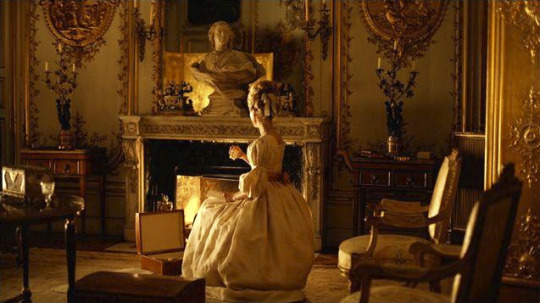
Loosely based on Chantal Thomas’ novel of the same name, Farewell, My Queen is a portrait of French nobility in decline, following maidservant Sidonie Labarde (Léa Seydoux) who is in the service of Marie Antoinette (Diane Kruger). It's a beautiful, lavish production which effectively conveys the perspective of a servant locked in the gilded cage that is Versailles during the French Revolution, and is a rare case of a historical figure as famous as Antoinette being presented as queer in a serious historical drama.
That being said, the queerness is mostly background, coming mainly in the form of Antoinette’s crush on? relationship with? duchess Gabrielle de Polignac (Virginie Ledoyen)— though a case can be made for Sidonie, whose outward opacity belies an unwavering, almost unsettling, devotion to her queen. Also, be warned that the movie has many a dodgy shot of cleavage, and two instances of unnecessary and voyeuristic nudity... but other than that, it really does have gorgeous cinematography.
Fun fact: there really were rumours about Antoinette having a scandalous relationship with the duchess, although these have nearly always been written off as baseless reputation-smearing.
Bonus - short film: Love Does Human / 사람 하는 사랑 (24 mins, 2019, dir. Oh Seon-ju) - MyDramaList
youtube
Some say that the best science fiction puts a spotlight on some part of the human condition, and this short film does just that. Main character Tae Eun's (Kim Min-ju) girlfriend Joo An (Jang Sam-yi) no longer has a human body: after carrying out a medical operation which transferred her consciousness to a computer system, she now has a web-camera for her eyes, a speaker for her mouth, and control over their home's devices for her hands. And although the change was by Joo An's choice and Tae Eun was supportive, the pair struggle to adjust to this new reality, and are confronted with the need to communicate and to consider each other's perspectives. Love Does Human has a bit of a slow start, and there were points where I didn't understand why the characters were reacting in a certain way, but it all comes together beautifully in the end. Through its sci-fi premise, viewers are encouraged to think about real-life problems using a different angle, and the movie never gets too heavy. Also, shoutout to some excellent voice work from the two actors - Joo An is performed nearly entirely through voice but she feels deeply human and present, and Tae Eun's actor also has a standout scene featuring some great voice acting. All in all, it's a short film that's well worth checking out (especially since the director has made it available for free, with English subtitles, on Youtube - embedded above)!
#sapphic#lesbian#gay#wlw#wlw media#moonlit winter#professor marston and the wonder women#debs#farewell my queen#love does human#wlw recommendations#list#sapphic films#whos the woman whos the man#金枝玉葉2#sisterhood 2016#骨妹
267 notes
·
View notes
Text
Superman '57: An Average Level Of Misogyny For The Time
This is Action Comics #235, an issue that must have prompted the DC editorial staff to look out across their office and wonder if they had accidentally made porn. Welcome to the Gutters.

DC comics has never been the most consistent in their worldbuilding. There are multiple versions of Atlantis, Mars, and the Greek Gods; time travel works vastly different from one story to another; and there are countless alien species and mysterious magical lands that appear once and then vanish back into the void. This causes issues when these worldbuilding aspects tie in with a superhero's origin, but if you wait long enough the universe will be reset and it won't matter.
This, though, is the first time that I've seen a story basically negate the premise of another character. We haven't talked about Wonder Woman yet, because there's still some confusion whether she's on Earth 1 or Earth 2, but she had been published in comics since 1941. It was created as a kind of representative character for the feminist ideals of William Moulton Marston and Elizabeth Holloway Marston. They were both psychologists, they were married, they invented the polygraph, and they were both in a poly relationship with Olive Byrne, who was the inspiration for Wonder Woman. She is an incredibly complex and nuanced character, and this issue feels like a very wrong-headed and mean-spirited pisstake.
The story starts with Lois Lane attending a meeting of a "Super Sorority" of women who were saved by Superman. Their newest member owns a fancy yacht, so they go on a pleasure cruise, but it almost immediately gets Gilligan's Islandeded on Amazon Island. It just hit me that this comic I'm talking about in 2025 is older than Gilligan's Island. Time just keeps on going.

The amazons enslave Superman because of Amazon law. Through an amazing coincidence the chains are made of kryptonite, but by a second coincidence the kryptonite doesn't affect Superman at all. He plays dumb in order to find out what this antidote factor is. Shenanigans happen. Honestly, the page up there is the whole plot. The rest of the issue is Lois and friend trying to come up with an impossible task for Superman and Superman outwitting them.
Superman gets out of this by destroying the queen's crown, which legally destroys her authority, and the whole thing is moot. However, once he does that, he starts feeling weakened by the kryptonite again. It turns out that some material in the crown was negating the kryptonite, and he just destroyed it. Instead of just looking for more on this small island, everyone just goes home and forgets about it. The story ends with Superman grateful that he doesn't have to marry Lois Lane, a woman he hates with the fury of a thousand yellow suns.
I'm not an expert on Wonder Woman, but this feels like somebody tried to take every common aspect of Wonder Woman lore and pull it inside-out. Wonder Woman was a strong, empathetic woman from an enlightened, advanced civilization of amazons. These amazons are materialistic, hateful, and self interested. Wonder Woman's amazons practiced consensual bondage, which was seen as an expression of love in their society. These amazons will enslave any man who sets foot on their island. Wonder Woman was created as a feminist icon to show that not only could a woman be as good as a man, she would be better. The amazons in this story exist to be outdone by the most powerful man in the world.
I can't imagine this story being written as anything but a dig at Wonder Woman, which is all the more strange considering that Wonder Woman was a flagship hero of their company. I do not care for it.

Anyway, greener pastures. I next wanna look at a story from Superman #117: "Clark Kent, Man of Mystery", which sadly is not a story where Clark becomes Austin Powers. In this story, Clark Kent apparently becomes possessed or hypnotized or brainwashed or something to keep trying to kill Perry White. Or so it seems, anyway. Clark is only faking it, and he knows that Superman is going to jump in and foil the assassination attempts anyway. However, Superman himself has no idea what Clark is even doing. As soon as he switches identities, his mind goes blank.
Comics of this era don't often look at a character's psychology, but this one gives us a rare look at Superman having identity issues. Superman has never really thought of Clark Kent as a different person, but as this short story goes on he begins to utterly lose his grip. By the end of it he's just straight up referring to Clark as a different person. Anyway it turns out to be some kind of bizarre accidental self-hypnosis thing because Clark and Superman signed the same plaque and somebody might realize they have the same handwriting. This plan culminates in Clark firing a gun in Perry's office. Everything goes back to normal again.

Finally, I have to indulge my deep abiding love for Clark Kent's sisyphean quest to live an ordinary life. This story from Superman #112, "Superman's Neighbors," shows the kind of work Clark Kent does to subtly improve the lives of the people around him while also disregarding their privacy. More on that later. I love the idea of Clark just sitting on his couch reading a book from miles away with his super vision. He's living the dream there.

This story presents an odd side to Superman as some kind of benevolent panopticon. He's constantly invading the privacy of the other tenants in his apartment building on the pretense of doing them favors, but like, if you knew about it you would never feel secure again. Imagine you light up a blunt in your 1950s apartment and Superman comes crashing through your wall and makes you watch Reefer Madness.

The plot of this story is that some amateur private investigator named Alex Ross (not that one) is investigating Clark Kent. Alex Ross (not that one) thinks Kent is secretly a criminal, but Superman knows he could accidentally discover his secret identity. There's an element of plausible deniability in the wording of his made-up cover story, but I'm 90% sure Superman is insinuating that he and Clark are lovers. Now that I think of it, Alex Ross (not that one) feels queer-coded as well. Sort of Sal Mineo vibe to him. More power to them, I say.
Anyway, we follow this post up with a figurative - and literal - trip back into Superman's past as Superboy. Until next time!
#dc#dc comics#comics#comics history#comics lit#silver age dc#superman#clark kent#kal el#lois lane#clois#but like a hateship#alex ross#not that one#action comics#perry white#wonder woman#william moulton marston#lgbtqia
8 notes
·
View notes
Text
Sorry for all the Professor Marston and the Wonder Women spam below but OH MY GOD THIS MOVIE
Also spoilers but when Elizabeth, Bill, and Olive have all been together, and then Olive reveals she's pregnant, and Elizabeth is talking about their situation, and Bill says "it's your baby too" BECAUSE THEY WERE BOTH WITH OLIVE DURING CONCEPTION AHHHH
I'm gonna die, go watch movie, bye
42 notes
·
View notes
Text
@queenofattolia OOOOH MY FAVORITE THROUPLES!!!!!!!!! SMASH THAT READ MORE BUTTON
ben/maddie/ryn ~ siren (never forgive never forget that breakup, they were PERFECT. that show ended with season 2 and i will NEVER EVER EVER forgive season 3's crimes)
kala/rajan/wolfgang ~ sense8 (we were denied a full series arc of them getting together, but frankly i didn't feel it was rushed in the finale. it still felt organic TO ME, largely bc the chemistry between rajan and wolfgang was impeccable immediately)
eliot/hardison/parker ~ leverage (can you believe there's people who watch leverage that don't ship this?!!?!?! there are human beings out there who ship eliot/parker with zero hardison involvement. BAFFLED, FRIENDS)
angel/buffy/cordy ~ btvs/ats (i'm sorry this is based on my own brain falling into the depths of madness when s6/s3 were airing and i was banned from watching buffy so i was reading the transcripts on buffyworld and left to stew over how much i wanted buffy and dawn and tara to flee to la and never look back, while also falling in love with cangel and thinking about how much those three would fit perfectly together, buffy and cordy as two sides of the same coin, just always out of step with the others parallel heroic journey, how much bangel would work so much more for me when it's damaged adults coming together and also raising their impossible blue eyed kids together also connors never kidnapped also also faith moves into the hyperion too and gunn and fred never break up the end okay i'll stop now)
the princess, the prince, and the mermaid ~ the little mermaid (i was infected by the novel mermaid: a twist on the classic tail (heh) in my youth- christopher, lenia, and margrethe had a fascinating relationship i fell in love with. and now!!!!!!!! watching older adaptations of tlm, seeing the interactions between the three of them always intrigue me so hard. pre-disney the princess is allowed to be sweet and kind to the mermaid, if somewhat patronizing to the mute young girl. and when the mermaid fades away, her body in foam and her soul off to heaven, she lays a kiss on the grieving princess's head AND I DIE)
elizabeth/neal/peter ~ white collar (IT WAS SUCH A FUN TRIO I STAND BY THIS CHOICE! also at the time it was extraordinarily refreshing of fandom to not immediately despise and vilify the woman standing between their slash ship. and i adored the canon and the fanon so tbh! this will always stick out as a classique ot3 to me!)
irma/marion/miranda ~ picnic at hanging rock (why aren't we frolicking in oz, wearing white gowns and eating picnic treats RIGHT NOW? anyway they're in love, they're so in love they fell into an alternate dimension)
ann/ben/leslie ~ parks and recreation (am I the only person who was tearing my hair out during ann's search for a sperm donor bc why did leslie never offer up ben's specimen!?!?! she is OBSESSED with ann and way too invasive and beyond controlling and I think way too much about that episode where ben and ann are fighting over the wafflemaker for one of leslie's insane random holidays, then end it off by coming together to make leslie STOP with the incessant celebrations and presents? anyway they should have all wound up together. and not just bc chris was terrible)
huoxin/jing/xiaowei ~ painted skin the resurrection (the lady demon, the princess, and the bodyguard. this trio was EVERYTHING. the demon fixated on the princess and her heart, the princess desperately in love with her bodyguard turned general but clinging to shame over her facial scars, the general who runs from his failure to protect her. ADD IN BODYSWAP SHENANIGANS AND I LOSE MY MIND EVERY TIME.)
ezra/jules/richie ~ imposters (possibly partially queerplatonic bc i'm not exactly sure where jules lies on ye olde kinsey scale, but even if it's platonic on her part i'm incredibly in love with this trio and i SO see it as a working throuple LEAVE ME ALONE)
elizabeth/olive/william ~ professor marston and the wonder women (whether you believe the historical accuracy of this movie or not, this throuple is fucking awesome and i adooooooore them)
gwen/mj/peter ~ marvel comics (i'm so sick of thinking about spider-man rn bc *waves hand at mcu* HOWEVER it would feel disingenous to leave this off my list. i love these three, i love them together so much.)
alex/hal/tom ~ being human uk (the way these characters brought new life to this era of bhuk. these three are in LOVE)
chel/miguel/tulio ~ the road to el dorado (baby's first ot3)
kirk/spock/uhura ~ star trek (THE KELVIN TIMELINE!!!!!!!!!!! THEY'RE SO MUCH. still mourning a fic that was deleted off ao3....... sad bean bear city)
art/patrick/tashi ~ challengers (THEEEEEEEEEEEE PINNACLE! there are ppl who cast tashi as the villain of the story and think art and patrick will flee her when the credits roll, and i am so glad i am not surrounded by those types. this is a love story where every person is desperately needed to complete the triad. they just don't work without all 3 of them)
clark/lana/lex ~ smallville (LOOK LOOK LOOK. SHUT UP. anyway i rewatched this show with my father at the height of the pandemic and lana/lex hit hard in a way it never had before, so now i'm p equally obsessed with every side of this triangle and now i want to smash them all together so bad. THIS IS HOW TO FIX EVERYTHING.)
gaby/ilya/napoleon ~ the man from uncle (ready made ot3, i can't be mad)
mylene/shaolin/zeke ~ the get down (did mylene and shaolin hate each other? uhhhhhhh yep. HOWEVER. THAT ALLOWED FOR SOME FUCKING GREAT TENSION. and they were both equally in love with zeke so like............ i wanted it so bad
i'm SURE i'm missing very important ones, but these are my broad strokes 💗💗💗
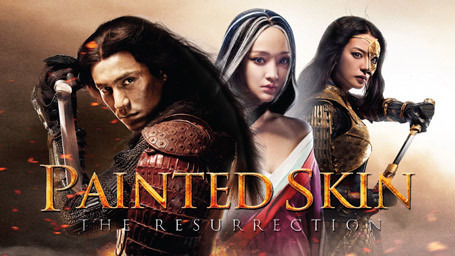
ALSO LOOK AT THEM!!!!!!!!! TELL ME YOU DON'T SHIP THEM IMMEDIATELY
#queenofattolia#personal#so close to adding arthur/guinevere/lancelot but i still haven't read that modern au book series caro recced#TO BE DETERMINED
11 notes
·
View notes
Text
A paper I wrote a few years ago. I have take out name, class, date, etc for privacy reasons
WONDER WOMAN, ALTHOUGH COMING FROM A FETISHIZED BACKGROUND, WAS CREATED TO BE A TRUE FEMINIST.
Wonder Woman was not created to be a typical superhero for DC Comics. William “Charles” Marston created Wonder Women to save the world in so many ways. World War II started on September 1, 1939, and two years later, Marston created Wonder Woman as psychological propaganda to end WWII and wars to come. Married and working with his wife Elizabeth Holloway in the psychology department at Tufts University in the 1920s, they both worked on building the lie detector machine. Elizabeth and William found Olive Bryne who volunteered to help the Marstons in their research, the three together were able to complete the lie detector in 1921. Over dinner, all three had discussed Olive’s origins; Olive expressed that she was the niece of Margaret Sanger. Both Elizabeth and William in 1912 had marched with Margaret’s Sanger in her campaign in educating women in sex and to express free love. As the three grew close it was clear to them they had feelings for each other; William believed that both of the women who he grew to love more together were the best qualities of women. Marston had confidence that women could use their charms and feminine aspects to change the world as it had changed him using truth, love, and dominance. Behind the scenes when BDSM (Bondage and Discipline, Dominance and Submission, Sadochism and Masochism) was illegal the three would go privately to shibari; the art of rope shows expressing the ideas of dominance and submission. While teaching at Tuft, William taught what is called the DISC theory standing for Dominance, Influence, Submission, Compliance. William Marston believed that men needed to submit to women but they wouldn’t do it willingly. I am convinced with the background history of BDSM, Wonder Woman was created with the values to be a feminist pop icon.
Professor Marston and his Theories
Marston was one of the first in his field in 1920 to practice and teach about D/s, which stands for Dominance and Submission. After teaching law, Marston in 1922 went on to teach Psychology. He taught young women in his classes DISC standing for Dominance, Influence, Submission, And Compliance: “Marston proposed that human behavior was directed principally by domination and loving submission. Related to this model were Marston’s views on female equality and his belief that women should rule the world, given their greater capacity for love.” He believed that men wouldn't willingly submit and that it would take women of the world to help. Throughout Wonder Woman, people can see Marston’s beliefs of dominance and submission his mistress Olive said “The Marston psychology of living…was injected into every page of WW.” He suspected that during his time in the 1920s that women were not up to date. He felt women were ashamed of themselves for the stereotypes of being weak, small, without a voice. I give credit to Lepore shedding light on behalf of Marston’s creation where Marston through Wonder Woman wanted to fight these beliefs for women that they shouldn’t feel ashamed but to feel empowered through Wonder Woman, “She wore a golden tiara, a red bustier, blue underpants and knee-high, red leather boots. She was a little slinky; she was very kinky. She’d left Paradise to fight fascism with feminism, in “America, the last citadel of democracy, and of equal rights for women!” I believe that is why he loved his wife Elizabeth for the way she was outspoken, fierce, brave, and had a work ethic and also loved his girlfriend Olive for she was submissive but was confident, bold, and shared her truth with hesitation. However for all his beliefs, while also marching with one of the most well respected and known feminists Margaret Sanger, William wouldn’t share his secrets with the world and kept his secrets in Wonder Woman “For all his love of the spotlight and desire for respect and fame, Marston was never radical enough to openly stake his gender privilege against his ideals.” Marston, secretly with his wife and mistress during the time BDSM gatherings were illegal, would practice the lifestyle. Throughout the pages of the comic book of WW, people can catch bondage, chains, gags, and spanking. Between both men and women there was always a level of dominance and submission however women in his comic always dominated and prevailed.
His family of two women and four children
Marston and Elizabeth Holloway met as younger children. Growing up Holloway would occasionally dress as a boy and it excited Marston to change his view of what gender was. Holloway and Marston argued and fought but he always respected her viewpoints and how smart she was and always gave her credit for that. William and Elizabeth got married in 1915 and when once asked why she got married to Marston she said she was always afraid she would stand behind Marston’s shadow but that he respected her. The two worked very closely at home and at work, both working in the psychology field. Marston met Olive Bryne in 1925 and was her psychology professor. When Marston fell in love with Ms. Bryne, he gave his wife two options; either they all lived together in a relationship or he would leave her for Olive. Elizabeth Hollaway invited Olive Bryne to move in. Both women gave birth to William Marston’s children both have two kids. Hollaway went to work while Bryne stayed home and raised the children. It wasn’t until Later the Byrnes children found out their father was Charles Marston in the 60s. Marston, Holloway, and Byrne later as years went on participated in kink parties with 10 other individuals. Most of the parties were women dominatrix making their men submit to them. I am confident a lot of where Marston had got his ideas for Wonder Women and her stories that involve chains, whips, gags, rope, and bondage. I appreciate that Lepore was able to see however through the kink it was able to show Marston’s agenda through kink that there are feminist values in the comic, “The seemingly paradoxical themes of feminism and salacious sexual activities pervade the book from its opening pages, where Lepore describes the superheroine as “very kinky.” Cunningly, Lepore aligns Wonder Woman’s secret identity with the secret history of both her feminist roots and Marston’s political feminist agenda.”
Margaret Sanger
When Marston was a student Margaret Sanger had attended his campus in 1912 to share with females her ideas on feminism and birth control. Marston was so moved by Sanger’s ideas to get the rights for women to vote. I regard it as true that Wonder Woman was inspired by the two women in Marston’s life Margaret and her niece Olive Bryne. While Bryne lived with Marston and his Wife Elizabeth, Lepore explains the importance of this relationship, “She was also the niece of Margaret Sanger, one of the most important feminists of the 20th century. In 1916, Sanger and her sister, Ethel Byrne, Olive Byrne’s mother, had opened the first birth-control clinic in the United States. They were both arrested for the illegal distribution of contraception. In jail in 1917, Ethel Byrne went on a hunger strike and nearly died.” Walsh emphasizes how Sanger and Bryne inspired him explaining, “The voices of the real women in Marston’s life come through in carefully preserved Family Circle articles written by Olive Byrne, Marston’s mistress, Sanger’s niece, and the inspiration for Wonder Woman.” If you look at one of both photos you can see where Wonder Woman and A feminist artist Lou Rodgers’s art piece look almost alike. I am of the opinion that different artwork of feminist propaganda helped inspire Marston. Marston with three different feminists in his life it’s hard to argue that Wonder Woman wasn’t created with feminist values. Margaret Sanger would chain herself with chains to different poles to fight for the right for women to be able to vote and through the comics, you can see Wonder Woman busting out of the chains of “toxic masculinity” freeing herself with feminism. 

Bibliography
Hilty, Joan. “The Strongest and Wisest Amazon.” Women’s Review of Books 32, no. 3 (May 2015): 5–7.
Lepore, Jill. Secret History of Wonder Woman. New York, New York: Vintage, 2015.
Lepore, Jill. “The Surprising Origin Story of Wonder Woman.” Smithsonian.com. Smithsonian Institution, October 1, 2014. https://www.smithsonianmag.com/arts-culture/origin-story-wonder-woman-180952710/.
Ormrod, Joan. “The Secret History of Wonder Woman/Wonder Woman: Bondage and Feminism in the Marston/Peter Comics, 1941-1948.” Cinema Journal 55, no. 1 (Fall 2015): 187–92. doi:10.1353/cj.2015.0074.
Professor Marston and The Wonder Women. Italia: Sony pictures home entertainment, 2017.
Walsh, Colleen. “Harvard Receives Personal Papers of Wonder Woman's Complex Creator.” Harvard Gazette. Harvard Gazette, September 7, 2017. https://news.harvard.edu/gazette/story/2017/09/harvard-receives-personal-papers-of-wonder-womans-complex-creator/.
5 notes
·
View notes